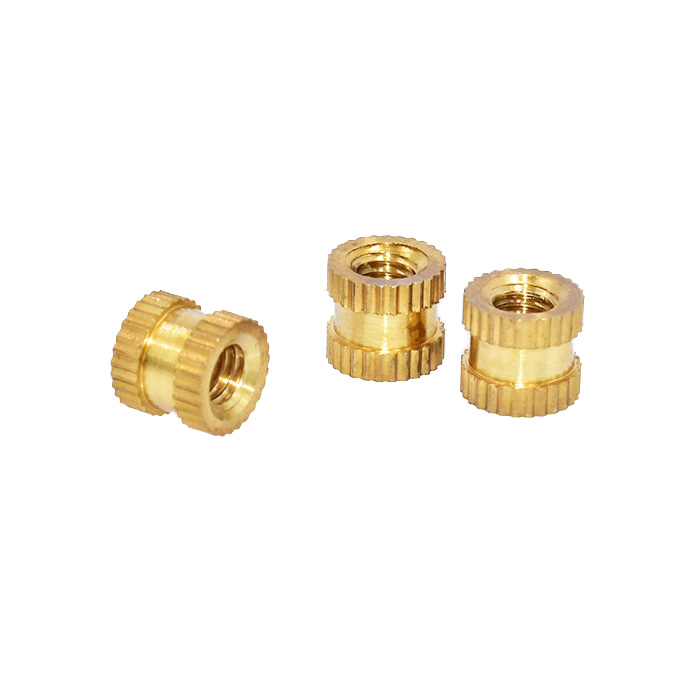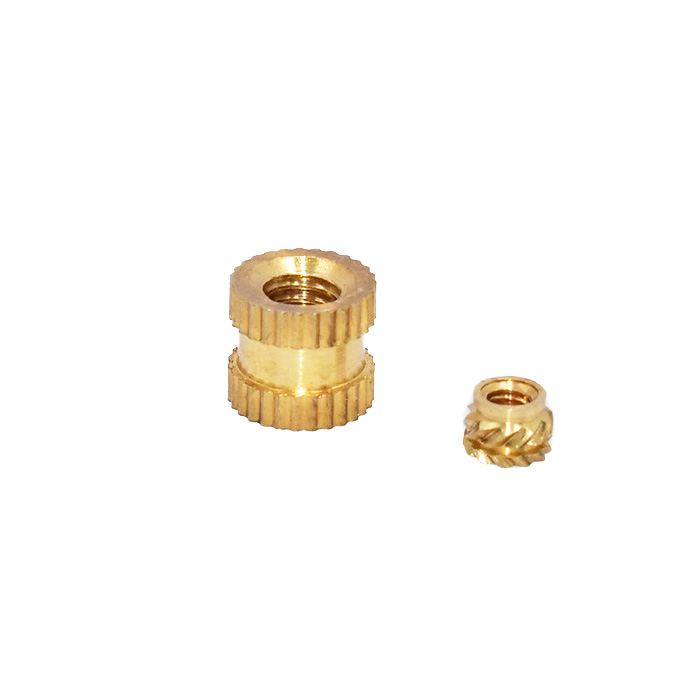What role does brass insert nut play in safety fastening?
Brass insert nuts play a crucial role in safety fastening, contributing to the overall integrity and reliability of assembled structures. Here are key aspects of the role that brass insert nuts play in ensuring safety:
Corrosion Resistance:Brass insert nuts are known for their excellent corrosion resistance. This is particularly important in safety-critical applications where exposure to environmental elements or moisture could compromise the integrity of fasteners. The corrosion resistance of brass helps maintain the structural integrity over time.
Durable and Long-Lasting:The durability of brass contributes to the long-lasting performance of insert nuts. In safety-critical applications, where reliability is paramount, using a material that withstands wear and tear ensures that fasteners maintain their strength and effectiveness throughout the operational lifespan.
High Strength:Brass insert nuts exhibit high strength, allowing them to withstand heavy loads and stresses. This characteristic is essential in safety-critical applications where the fasteners are subject to significant forces. The high strength of brass helps prevent structural failures and ensures the safety of assembled components.
Secure Threaded Connections:Brass insert nuts provide secure threaded connections, creating a reliable bond between components. The threaded engagement ensures that fasteners remain tightly secured, preventing loosening or failure that could compromise safety in critical applications.
Reduced Risk of Galling:Brass has anti-galling properties, meaning it is less prone to seizing or sticking during threaded connections. This reduces the risk of fasteners becoming stuck or difficult to remove, enhancing the maintenance and inspection processes in safety-critical systems.
Non-Sparking Properties:In environments where sparks could pose a safety hazard, such as those with flammable materials, the non-sparking properties of brass are advantageous. Brass insert nuts help mitigate the risk of sparking during installation or maintenance, contributing to overall safety.
Temperature Stability:Brass has good thermal stability, making brass insert nuts suitable for applications exposed to varying temperatures. This stability ensures that the fasteners maintain their structural integrity and effectiveness in safety-critical systems operating in different environmental conditions.
Ease of Inspection:The visual inspection of brass insert nuts is facilitated by the distinctive appearance of brass. This ease of inspection allows for regular checks to ensure that fasteners are in good condition and that safety-critical components remain securely fastened.
Non-Magnetic Properties:Brass is non-magnetic, which is beneficial in applications where magnetic interference could impact sensitive equipment or systems. This property enhances the safety of operations in environments where magnetic neutrality is essential.
Applications in Electrical Safety:In electrical applications, brass insert nuts are commonly used due to their non-conductive properties. This prevents electrical conductivity through the fasteners, reducing the risk of electrical hazards and enhancing overall safety.
How does the choice of alloy impact the performance of the insert nuts?
The choice of alloy for
Aluminum Insert Nuts significantly impacts their performance in various aspects. Different aluminum alloys have distinct properties, including strength, corrosion resistance, machinability, and thermal conductivity. Here's how the choice of alloy can impact the performance of Aluminum Insert Nuts:
Strength:
Aluminum alloys vary widely in terms of strength. Alloys with higher strength, such as those in the 7000 series, provide better load-bearing capacity and durability. The choice of alloy can influence the nuts' performance in applications with varying stress levels.
Corrosion Resistance:
Some aluminum alloys, like those in the 5000 and 6000 series, offer excellent corrosion resistance. The choice of a corrosion-resistant alloy is crucial for applications exposed to harsh environments, moisture, or corrosive substances.
Machinability:
The machinability of aluminum alloys can vary. Certain alloys, such as those in the 6000 series, are known for their good machinability. This is important for the manufacturing process of insert nuts, affecting the ease of fabrication and precision.
Weight:
Aluminum is inherently lightweight, but different alloys have varying densities. Choosing a specific alloy allows manufacturers to optimize the weight of the insert nuts, making them suitable for applications where weight is a critical factor.
Thermal Conductivity:
Aluminum is an excellent conductor of heat. Alloys with enhanced thermal conductivity, such as those in the 1000 and 6000 series, are suitable for applications where heat dissipation is important.
Anodizing Ability:
Certain aluminum alloys, like those in the 6000 series, respond well to anodizing. Anodizing can improve the surface hardness, corrosion resistance, and aesthetic appearance of Aluminum Insert Nuts.
Cost:
Different aluminum alloys have varying costs. The choice of alloy can impact the overall cost of manufacturing the insert nuts. Balancing performance requirements with cost considerations is crucial for optimizing value.
Formability:
The formability of aluminum alloys influences how easily they can be shaped and molded. Some alloys are more suitable for intricate designs or specific manufacturing processes, affecting the versatility of insert nut applications.
Electrical Conductivity:
Certain aluminum alloys, particularly those in the 1000 and 6000 series, exhibit good electrical conductivity. This property is important for applications where electrical conductivity is a consideration.











